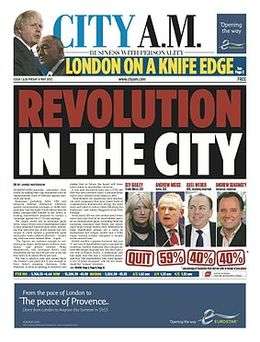City A.M.
|
A City A.M. front page from May 2012 | |
| Type | Daily newspaper |
|---|---|
| Format | Freesheet |
| Owner(s) | City A.M. Limited |
| Editor | Christian May |
| Founded | 2005 |
| Political alignment | Conservative |
| Language | English |
| Headquarters |
3rd Floor, Fountain House, 130 Fenchurch St, London EC3M 5DJ |
| Circulation | 90,911 (as of December 2016)[1] |
| Website |
www |
City A.M. is a free, business-focused newspaper distributed in and around London, England. Its certified distribution was 90,911 copies a day in December 2016, according to statistics compiled by the ABC, a drop of 7.93% year-on-year.[1]
History
City A.M. was launched in September 2005 and operates as an independent media company.
City A.M.'s editor is Christian May, formerly of the Institute of Directors.[2] The paper employs an editorial team of 27 across its four daily sections – news, business features and investment, lifestyle and sport. Its pagination averages around 40 tabloid full-colour pages a day.
City A.M.'s launch editor was former Sunday Times and Sunday Express journalist David Parsley. He was succeeded by Allister Heath, who joined in February 2008. He edited the paper for six years until June 2014. He was previously the editor of The Business, a weekly magazine which closed in February 2008. David Hellier, formerly of the Independent and the Daily and Sunday Express, replaced Heath and served until 2015 when he was replaced by May.
Content
The news section is primarily made up of corporate, financial and economic stories, as well as political and regulatory stories relevant to its readership. The paper regularly runs interviews of business leaders. The news pages also contain a variety of corporate and economic comment. The business features section is primarily dominated by investment, trading and wealth management pieces but also includes a range of articles on other business topics. The lifestyle pages cover a vast range of subject matters, including travel, restaurant reviews, food, fashion, technology, books, arts, entertainment, motoring and property. The sport section reports and comments on all the major events and games, with a bias towards sports of interest to London-based professionals. The paper's philosophy is broadly supportive of the free-market economy, of capitalism, of private enterprise and of the City of London and those who work in it. It endorsed the Conservative Party at the 2010 general election but was critical of several of the coalition's policies subsequently. Former editor Allister Heath argued that London and the south-east should be entitled to a greater rebate of UK tax revenue and has approved of the principle of London's becoming an independent city state.[3] He also proposed a libertarian tax policy abolishing all personal and corporation taxes and introducing a single income tax rate of 30% on personal earnings, dividends, rent and interest.[4] Heath's stance reflected the paper's classic liberal / libertarian philosophy, with a focus on capitalism and market forces as the drivers of economic and social progress.
The paper's front page is dominated by a large capitalised banner headline reminiscent of a traditional UK popular newspaper. The rest of the news stories, as well as the commentary and features, come in bite-sized chunks, in a modern compact-style format illustrated with images, bullet points and diagrams.
Distribution
The newspaper is published in print Monday to Friday and is distributed in London and the Home Counties via uniformed hand-distributors and unmanned racks. It is typically available from around 6am at London commuter stations and is handed out at key points in the City, Canary Wharf and other central London locations. The paper is also delivered to the offices of some large companies.
There are now three principal free newspapers in London: Metro (which also distributes nationally), City A.M. in the morning and the London Evening Standard in the evening. City A.M. is aimed at private-sector workers, especially those in finance, professional and business services and corporations, and those who are interested in investing and personal finance.
Website
The newspaper announced a major digital expansion in March 2014 and appointed Metro's head of digital content Martin Ashplant to be its digital and social media director. Chief executive Jens Torpe said at the time that he expected the website audience to grow to be bigger than the printed version.[5] In October 2014, City A.M. reported that it had seen its website traffic grow almost three-fold in a year.[6] Emma Haslett, who was appointed Online Editor in August 2014, was named Rising Star of the Year at the British Media awards 2015.[7] Under Ashplant and Haslett, cityam.com became the first UK newspaper website to prevent users with ad blockers switched on from reading content.[8]
References
- 1 2 "Print ABCs: Seven UK national newspapers losing print sales at more than 10 per cent year on year". Press Gazette. Retrieved 28 January 2017.
- ↑ Sweney, Mark. "City AM appoints Institute of Directors' Christian May as editor". The Guardian. London. Retrieved 27 June 2015.
- ↑ Heath, Allister (5 April 2012). "Boris is right to want to transform London into a city-state". City A.M. London. Retrieved 3 March 2015.
- ↑ "Calls for single 30% income tax rate". BBC News. 21 May 2012. Retrieved 3 March 2015.
- ↑ Fenwick, Jack (3 March 2014). "City AM plans online expansion and hires Metro head of digital content". Press Gazette. London. Retrieved 3 March 2015.
- ↑ "City A.M. appoints new editor and executive editor as title marks huge rise in digital reach". City A.M. 2 October 2014. Retrieved 15 July 2015.
- ↑ "Rising Star of the Year gong for City A.M.'s online editor Emma Haslett". City A.M. 7 May 2015. Retrieved 15 July 2015.
- ↑ Sweney, Mark (2015-10-20). "City AM becomes first UK newspaper to ban ad blocker users". The Guardian. ISSN 0261-3077. Retrieved 2017-03-03.
External links
| Wikimedia Commons has media related to City A.M.. |
